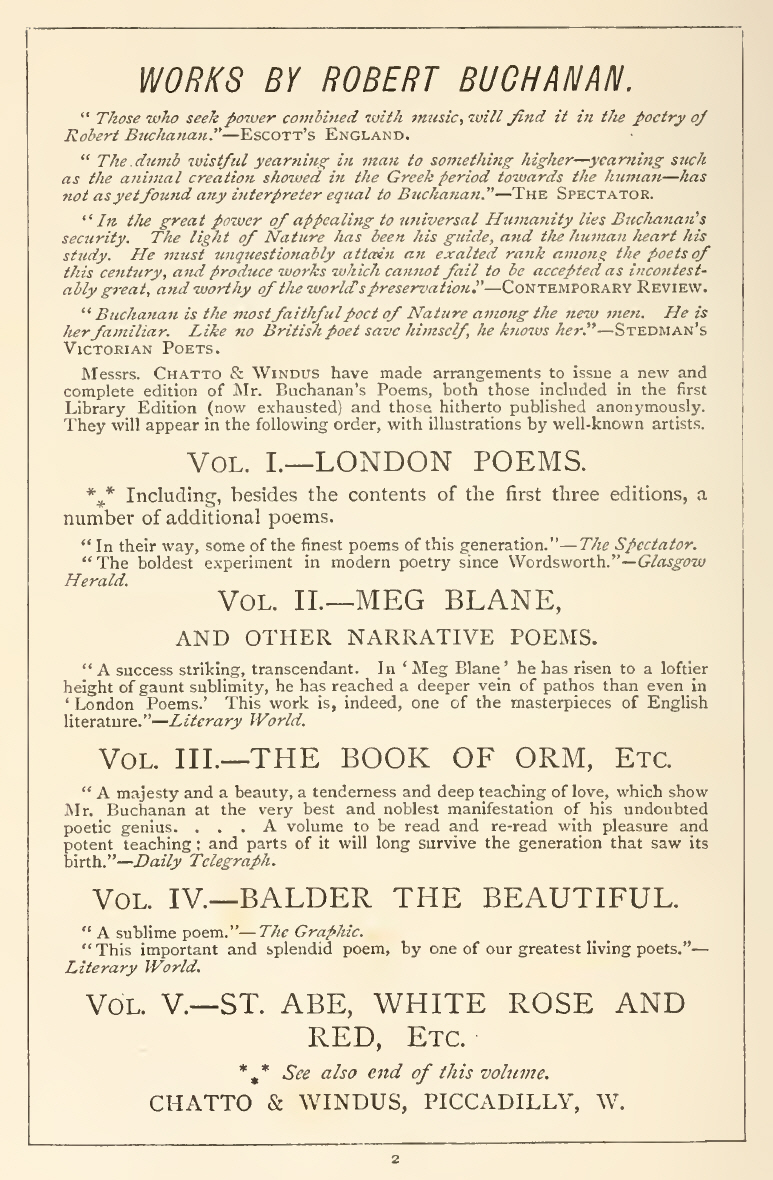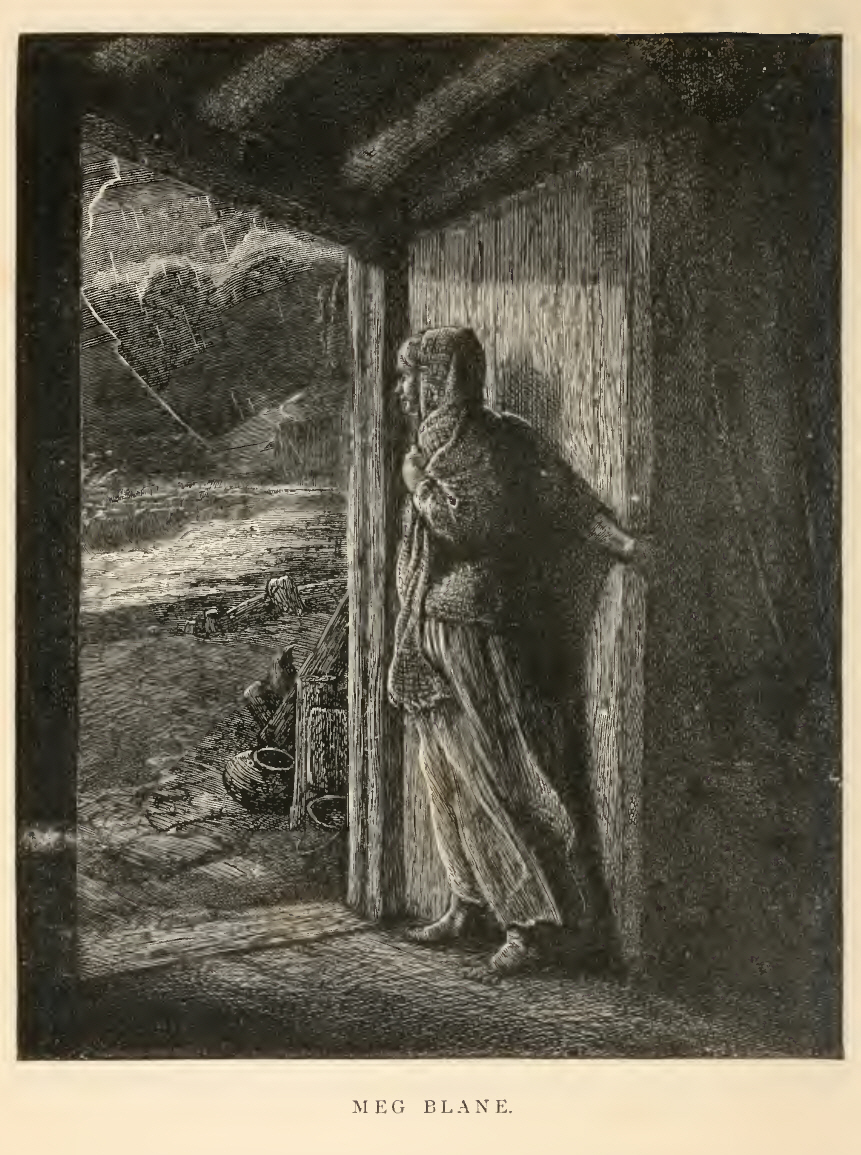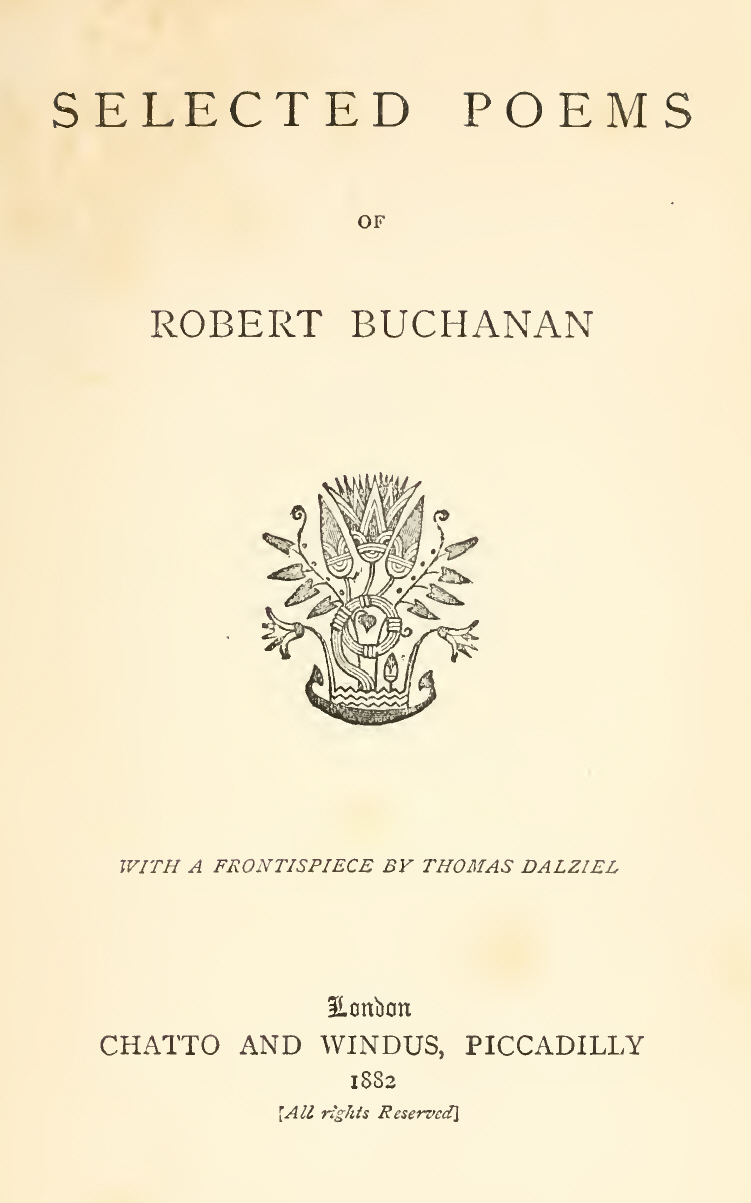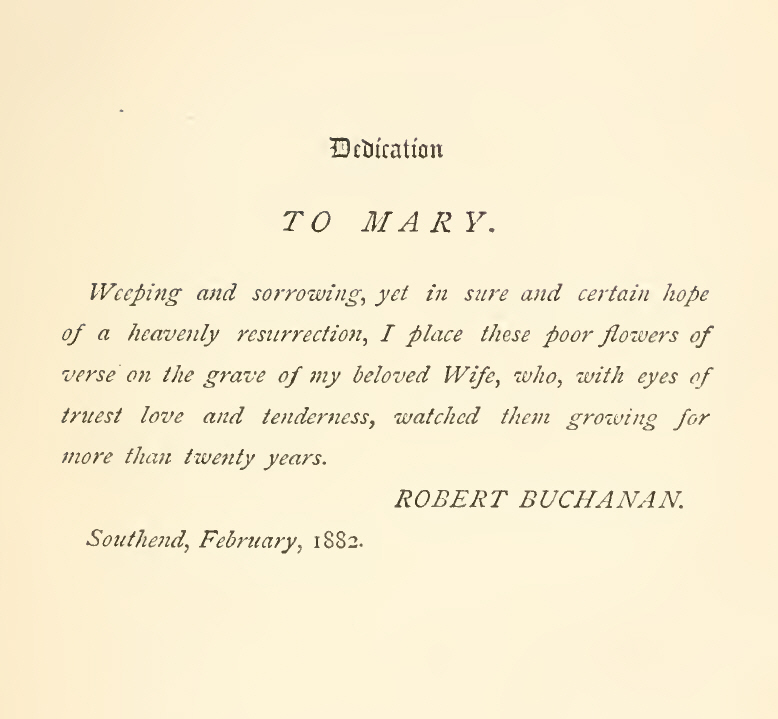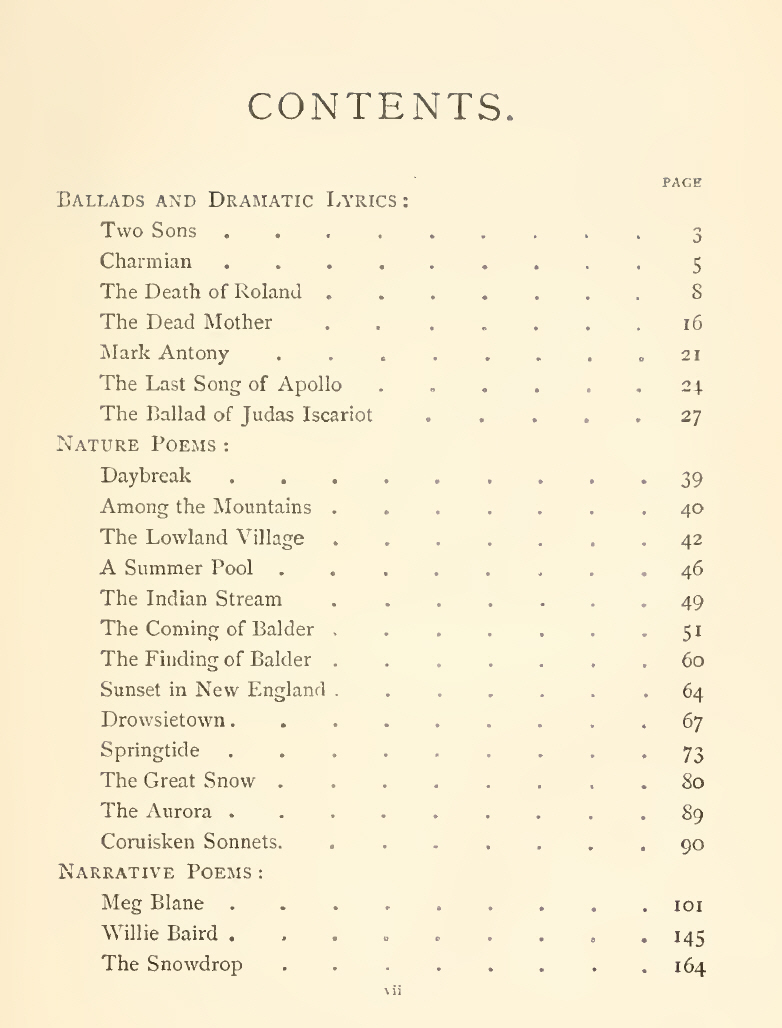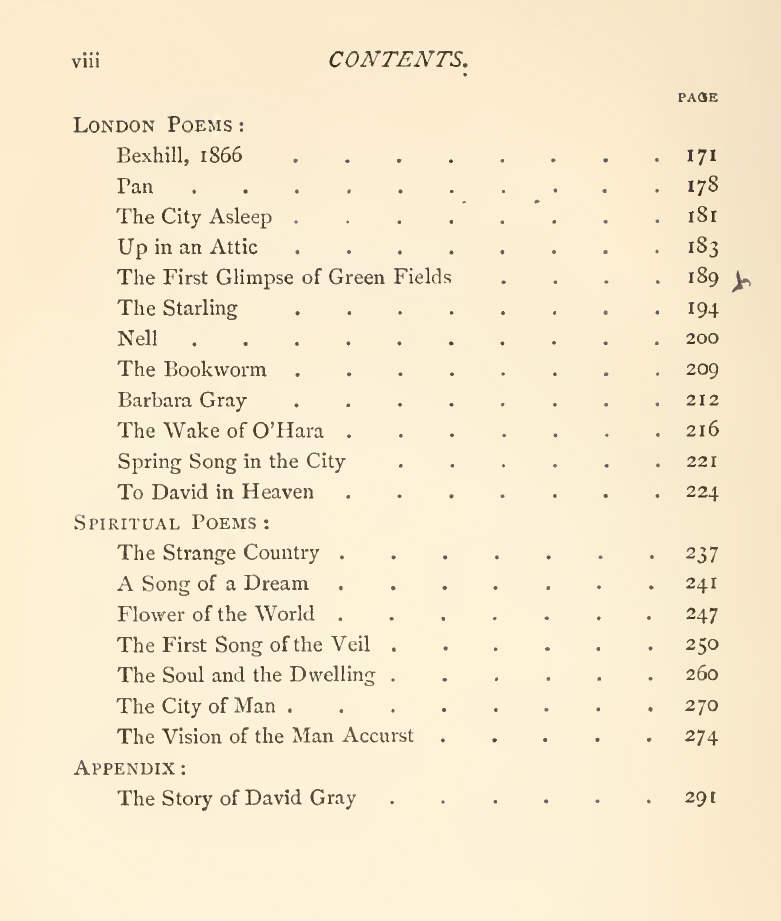|
BALLADS AND DRAMATIC LYRICS.
‘Two Sons’ - from the 1874 Poetical Works.
‘Charmian’ - originally published in The Broadway, August, 1867, reprinted in the 1874 Poetical Works.
‘The Death Of Roland’ - from London Poems, 1866. This is a shorter version of the poem, the first ten stanzas being omitted.
THE DEATH OF ROLAND.
I.
THEN it grew chiller far, the grass grew moist with dew,
The landskip glimmer’d pale, the mournful breezes blew,
The many stars above melted like snow-flakes white,
And far behind the hills the east was laced with light,
The dismal vale loom’d clear against a crimson glow,
Clouds spread above like wool, pale steam arose below,
And on the faces dead the frosty morning came,
On mighty men, and foes, and squires unknown to fame . . .
And golden mail gleam’d bright, and broken steel gleam’d gray,
And cold dew fill’d the wounds of those who sleeping lay;
And Roland, rising, drank the dawn with lips apart,
But scents were in the air that sicken’d his proud heart!
Yea, all was deathly still; and now, though it was day,
The moon grew small and pale, but did not pass away,
The white mist wreath’d and curl’d over the quick and dead,
A cock crew, far among the hills, and echoes answerëd.
II.
Then peering to the east, across the dewy steam,
He spied a naked wood, and there a running stream;
Thirsting full sore, he rose, and thither did he hie,
Faintly, and panting hard, because his end was nigh;
But first he stooping loosed from Turpin’s fingers cold
The Cross inlaid with gems and wrought about with gold,
And bare the holy Cross aloft in one weak hand,
And with the other trail’d great Adalmàr his brand.
Thus wearily he came unto the woody place,
And stooping to the stream did dip therein his face,
And in the pleasant cold let swim his great black curls,
Then swung his forehead up, glittering as with pearls;
And while the black blood spouted in a burning jet,
He loosed the bandage of his wound and made it wet,
Wringing the silken bands, making them free from gore,
Then placed them cool upon the wound, and tighten’d them once more.
III.
Eastward rose cloudy mist, drifting like smoke in wind,
Ghastly and round the sun loom’d dismally behind,
High overhead the moon faded with sickle chill,
The frosty wind dropp’d down, and all was deathlier still.
Then Roland, drawing deep the breath of vapours cold,
Beheld three marble steps, as of a ruin old,
And at the great tree-bolls lay many a carven stone,
Thereto a dial quaint, where slimy grass had grown;
And frosted were the boughs that gatherëd around,
And cold the runlet crept, with soft and soothing sound,
And Roland smilèd sweet, and thought, “Since death is nigh,
In sooth, I know no gentler place where gentle man could die!”
IV.
Whereon the warrior heard a sound of breaking boughs,
And, from the thicket wild, leapt one with painted brows;
Half-naked, glistening dark with oily limbs, he came,
His long-nail’d fingers curl’d, his little eyes aflame,
Shrieking in his own tongue, as on the chief he flew,
“Yield thee thy sword of fame, and thine own flesh thereto!”
Then Roland gazed and frown’d, though nigh unto his death,
Sat still, and drew up all his strength in a great breath,
Pray’d quickly to the saints he served in former days
With right hand clutch’d the sword he was too weak to raise,
And in the left swung up the Cross! and, shrieking hoarse,
Between the eyebrows smote the foe with all his force!
Yea, smote him to the brain, crashing through skin and bone,
And prone the heathen fell, as heavy as a stone,
And gold and gems of price were loosen’d by the blow,
And, as he fell, rain’d round the wild hair of the foe;
But Roland kiss’d the cross, and, laughing, backward fell,
And on the hollow air the laugh rang heavy, like a knell.
V.
And Roland thought: “I surely die; but, ere I end,
Let me be sure that thou art ended too, my friend!
For should a heathen hand grasp thee when I am clay,
My ghost would grieve full sore until the judgment day!”
Then to the marble steps, under the tall bare trees,
Trailing the mighty sword, he crawl’d on hands and knees,
And on the slimy stone he struck the blade with might—
The bright hilt, sounding, shook, the blade flash’d sparks of light;
Wildly again he struck, and his sick head went round,
Again there sparkled fire, again rang hollow sound;
Ten times he struck, and threw strange echoes down the glade,
Yet still unbroken, sparkling fire, glitter’d the peerless blade.
VI.
Then Roland wept, and set his face against the stone—
“Ah, woe, I shall not rest, though cold be flesh and bone!”
And pain was on his soul to die so cheerless death;
When on his naked neck he felt a touch like breath!
He did not stir, but thought, “O God, that madest me,
And shall my sword of fame brandish’d by heathens be?
And shall I die accursed, beneath a heathen’s heel,
Too weak to slay the slave whose hated breath I feel?”
Then, clenching teeth, he turn’d to look upon the foe,
His great eyes growing dim with coming death; and lo!
His life shot up in fire, his heart arose again,
For no unhallow’d face loom’d dark upon his ken,
No heathen-breath he felt,—though he beheld, indeed,
The white arch’d head and round brown eyes of Veillintif, his steed!
VII.
And pressing his moist cheek on his who gazed beneath,
Curling the upper lip to show the large white teeth,
The white horse, quivering, look’d with melancholy eye,
Then waved his streaming mane, and uttered up a cry;
And Roland’s bitterness was spent—he laugh’d, he smiled,
He clasp’d his darling’s neck, wept like a little child;
He kiss’d the foamy lips, and hugg’d his friend, and cried:
“Ah, nevermore, and nevermore, shall we to battle ride!
Ah, nevermore, and nevermore, shall we sweet comrades be.
And Veillintif, had I the heart to die forgetting thee?
To leave thy mighty heart to break, in slavery to the foe?
I had not rested in the grave, if it had ended so.
Ah, never shall we conquering ride, with banners bright unfurl’d,
A shining light ’mong lesser lights, a wonder to the world!”
VIII.
And Veillintif neigh’d low, breathing on him who died,
Wild rock’d his great strong heart beneath his silken side,
Tears roll’d from his brown eyes upon his master’s cheek,
And Roland, gathering strength, though wholly worn and weak,
Held up the point of Adalmàr the peerless brand,
And at his comrade’s heart push’d with his dying hand;
And the black blood sprang forth, while heavily as lead,
With quivering, silken side, the mighty steed fell dead!
And Roland, since his eyes with frosty film were dim,
Groped for the steed, crept close, and smiled, embracing him,
And, pillow’d on his neck, kissing the pure white hair,
Clasp’d Adalmàr the brand, and tried to say a prayer,
And that he conquering died, wishing all men to know,
Set firm his lips, and turn’d his face towards the foe,
And closëd eyes, and slept, and never woke again.
Roland is dead, the gentle knight! dead is the crown of men!
___
‘The Dead Mother’ - from Idyls and Legends of Inverburn, 1865, where its original title was ‘The Legend Of The Stepmother’.
‘Mark Antony’ - from Undertones, 1863, where its original title was ‘Antony In Arms’. This differs slightly from the original version, which is the one included in the 1884 Poetical Works.
‘The Last Song Of Apollo’ - originally published as ‘The Swan-Song Of Apollo’ in the second edition of Undertones, 1865. A revised and retitled version was published in the 1874 Poetical Works and this version adds a few more changes.
‘The Ballad Of Judas Iscariot’ - originally published in The Saint Pauls Magazine, February, 1872 and reprinted in the 1874 Poetical Works.
NATURE POEMS.
‘Daybreak. (Fragment)’ - This seems to be the first publication of ‘Daybreak’ (at least in book form).
DAYBREAK.
(Fragment.)
BUT now the first faint flickering ray
Fell from the cold east far away,
The birds awoke and twitter’d, hover’d,
The dim leaves sparkled in the dew—
Earth slowly her dark head uncover’d
And held her blind face up the blue,
Till the fresh consecration came
In yellow beams of orient flame,
Touching her, and she breathed full blest
With lilies heaving on her breast.
Seas sparkled, dark capes glimmer’d green,
As Dawn crept on from scene to scene,
Lifting each curtain of the night
With fingers flashing starry-white.
___
‘Among The Mountains’ - This is an extract from ‘Up The River’, originally published in the October 1862 edition of The St. James’s Magazine, a section of which was then published as ‘In The Mountains’ - the second part of ‘Pastoral Pictures’ - in the Second Edition of Idyls and Legends of Inverburn (1866). In subsequent versions of ‘Pastoral Pictures’, the original title, ‘Up The River’ was retained.
AMONG THE MOUNTAINS.
The sunlight fades on mossy rocks,
And on the mountain-sides the flocks
Are spilt like streams;—the highway dips
Down, narrowing to the path where lambs
Lay to the udders of their dams
Their soft and pulpy lips.
The hills grow closer; to the right
The path sweeps round a shadowy bay,
Upon whose slated fringes, white
And crested wavelets play.
All else is still. But list, oh list!
Hidden by boulders and by mist,
A shepherd whistles in his fist;
From height to height the far sheep bleat
In answering iteration sweet;
Sound, seeking Silence, bends above her,
Within some haunted mountain grot;
Kisses her, like a trembling lover—
So that she stirs in sleep, but wakens not!
. . . Along this rock I’ll lie,
With face turn’d upward to the sky.
A dreamy numbness glows within my brain—
It is not joy and is not pain—
’Tis like the solemn, sweet imaginings
That cast a shade on Music’s golden wings.
With face turn’d upward to the sun,
I lie as indolent as one
Who, in a vision sweet, perceives
Spirits thro’ mists of lotus leaves;
And as I lie soft shadows move
Across me, cast by clouds so small
Mine eyes perceive them scarce at all
In the unsullied blue above.
I hear the streams that burst and fall,
The straggling shepherd’s frequent call,
The cattle lowing as they pass,
The dark lake stirring with the breeze,
The melancholy hum of bees,
The very murmur of the grass.
___
‘The Lowland Village’ - This is an extract from the Preamble to Idyls and Legends of Inverburn, 1865. In the 1884 Poetical Works, ‘The Lowland Village’ replaced the original ‘Preamble’ in the Inverburn section.
THE LOWLAND VILLAGE.
Seven pleasant miles by wood, and stream, and moor,
Seven miles along the country road that wound
Uphill and downhill in a dusty line,
Then from the forehead of a hill, behold—
Lying below me, sparkling ruby-like—
The village!—quaint old gables, roofs of thatch,
A glimmering spire that peep’d above the firs,
The sunset lingering orange-red on all,
And nearer, tumbling thro’ a mossy bridge,
The river that I knew! No wondrous peep
Into the faëry land of Oberon,
Its bowers, its glowworm-lighted colonnades
Where pigmy lovers wander two by two,
Could weigh upon the city wanderer’s heart
With peace so pure as this! Why, yonder stood,
A fledgeling’s downward flight beyond the spire,
The grey old manse, endear’d by memories
Of Jean the daughter of the minister;
And in the cottage with the painted sign,
Hard by the bridge, how many a winter night
Had I with politicians sapient-eyed
Discuss’d the county paper’s latest news
And read of toppling thrones!—And nought seem’d changed!
The very gig before the smithy door,
The barefoot maiden with the milking pail
Pausing and looking backward from the bridge,
The last rook wavering homeward to the wood,
All seem’d a sunset-picture, every tint
Unchanged, since I had bidden it farewell.
My heart grew garrulous of olden times
And my face sadden’d, as I saunter’d down.
There came a rural music on my ears,— [1:32]
The waggons in the lanes, the waterfall
With cool sound plunging in its wood-nest wild,
The rooks amid the windy rookery,
The shouts of children, and more far away
The crowing of a cock. Then o’er the bridge
I bent, above the river gushing down
Thro’ mossy boulders, making underneath
Green-shaded pools where now and then a trout
Sank in the ripple of its own quick leap;
And like some olden and familiar tune,
Half humm’d aloud, half tinkling in the brain,
Troublously, faintly, came the buzz of looms.
And here I linger’d, nested in the shade
Of Peace that makes a music as she grows;
And when the vale had put its glory on
The bitter aspiration was subdued,
And Pleasure, tho’ she wore a woodland crown,
Look’d at me with Ambition’s serious eyes.
Amid the deep green woods of pine, whose boughs
Made a sea-music overhead, and caught
White flakes of sunlight on their highest leaves,
I foster’d solemn meditations;
Stretch’d on the sloping river banks, fresh strewn
With speedwell, primrose, and anemone,
I watch’d the bright king-fisher dart about,
His quick small shadow with an azure gleam
Startling the minnows in the pool beneath;
Or later on the moors, where far away
Across the waste the sportsman with his gun
Stood a dark speck across the blue sky, while [2:18]
The heath-hen tower’d with beating wings and fell,
I caught the solemn wind that wander’d down
With thunder-echoes heaved among the hills.
Nor lack’d I, in the balmy summer nights,
Or on the days of rain, such counterpoise
As books can give. The honey-languaged Greek
Who gently piped the sweet bucolic lay,
The wit who raved of Lesbia’s loosen’d zone
And loved divinely what was less than earth,
Were with me; others, of a later date:
The eagle-eyed comedian divine;
The English Homer, not the humpback’d one
Who sung Belinda’s curl at Twickenham,
But Chapman, master of the long strong line;
Moreover, those few singers who have lit
The beacon-lights of these our latter days—
Chief, young Hyperion, who setting soon
Sent his pale look along the future time,
And the tall figure on the hills, that stoopt
To see the daisy’s shadow on the grass.
[Notes:
Alterations in the 1884 edition of The Poetical Works of Robert Buchanan:
v.1, l. 32: Then came a rural music on my ears,—
v. 2, l. 18: Stood a dark speck across the azure, while ]
___
‘A Summer Pool’ - originally published in All The Year Round (28 August, 1869). The poem was added to the ‘Pastoral Pictures’ sequence in the 1874 Poetical Works.
‘The Indian Stream. (From “St. Abe.”)’ - an extract from Section V of the first part (‘Approaching Utah.—The Boss’s Tale’) of St. Abe and his Seven Wives, 1872.
THE INDIAN STREAM.
(From “St. Abe.”)
From pool to pool the wild beck sped
Beside us, dwindled to a thread.
With mellow verdure fringed around
It sang along with summer sound:
Here gliding into a green glade;
Here darting from a nest of shade
With sudden sparkle and quick cry,
As glad again to meet the sky;
Here whirling off with eager will
And quickening tread to turn a mill;
Then stealing from the busy place
With duskier depths and wearier pace.
In the blue void above the beck
Sailed with us, dwindled to a speck,
The hen-hawk; and from pools below
The blue-wing’d heron oft rose slow,
And upward pass’d with measured beat
Of wing to seek some new retreat.
Blue was the heaven and darkly bright,
Suffused with throbbing golden light,
And in the burning Indian ray
A million insects humm’d at play.
___
‘The Coming Of Balder. (From “Balder the Beautiful.”)’ - originally published as ‘Balder Is Here’ - the first section of the fourth part, ‘Balder’s Return To Earth’, of Balder The Beautiful, 1877. Buchanan adds this note:
“Balder is—conceived in a certain sense, and for the purpose of the present poem read apart from its context—simply theSun-god, or Spirit of Summer.”
___
‘The Finding Of Balder. (From “Balder the Beautiful.”)’ - an extract from ‘Frea In The Wood’ - the first section of the second part, ‘The Finding Of Balder’, of Balder The Beautiful, 1877.
THE FINDING OF BALDER.
(From “Balder the Beautiful.”)
BEFORE her lay a vast and tranquil lake,
And wading in its shallows silently
Great storks of golden white and light green cranes
Stood sentinel, while, far as eye could see,
Swam the wild water-lily’s oilëd leaves.
Still was that place as sleep, yet evermore
A stir amid its stillness; for behold,
At every breath of the warm summer wind
Blown on the beating bosom of the lake,
The white swarms of the new-born lily-flowers,
A pinch of gold-dust in the heart of each,
Rose from the bubbling depths, and open’d up,
And floated luminous with cups of snow.
Across that water came so sweet an air,
It fell upon the immortal mother’s brow
Like coolest morning dew, and tho’ she stood
Beneath the open arch of heaven, the light
Stole thro’ the gauze of a soft summer mist
Most gentle and subdued. Then while she paused
Close to the rippling shallows sown with reeds,
Those cranes and storks arose above her head
In one vast cloud of flying green and gold;
And from the under-heaven innumerable
The lilies upward to the surface snow’d,
Till all the waters glitter’d gold and white;
And lo! the sun swept shining up the east,
And thro’ the cloud of birds, and on the lake,
Shot sudden rays of light miraculous,—
Until the goddess veil’d her dazzled eyes,
And with the heaving whiteness at her feet
Her bosom heaved, till of that tremulous life
She seem’d a throbbing part!
Tall by the marge
The goddess tower’d, and her immortal face
Was shining as anointed; then she cried,
“Balder!” and like the faint cry of a bird
That passeth overhead, the sound was borne
Between the burning ether and the earth.
Then once again she called, outstretching arms,
“Balder!” Upon her face the summer light
Trembled in benediction, while the voice
Was lifted up and echoed till it died
Far off amid the forest silences.
A space she paused, smiling and listening,
Gazing upon the lilies as they rose
Large, luminously fair, and new-baptized;
And once again she would have call’d aloud,
When far across the waters suddenly
There shone a light as of the morning star;
Which coming nearer seem’d as some bright bird
Floating amid the lilies and their leaves,
And presently, approaching closer still,
Assumed the likeness of a shining shape,
Who, with white shoulders from the waters reaching,
And sunlight burning on his golden hair,
Swam like a swan. Upon his naked arms
The amber light was melted, while they clove
The crystal depths and softly swept aside
The glittering lilies and their clustering leaves;
And on the forehead of him burnt serene
A light as of a pearl more wonderful
Than ever from the crimson seas of Ind
Was snatch’d by human hand; for pearl it seem’d,
Tho’ blood-red, and as lustrous as a star.
Him Frea breathless watch’d, for all the air
Was golden with his glory as he came;
And o’er his head hover’d the cloud of birds
With clangour deep; and thro’ the lake he swam
With arm-sweeps swift, till in the shallows bright,
Still dripping from the kisses of the waves,
He rose erect in loveliness divine.
The lustre from his ivory arms and limbs
Stream’d as he stood, and from his yellow hair
A splendour rain’d upon his neck and breast,
While burning unextinguish’d on his brow
Shone that strange star.
Then as he shining rose,
And on her form the new effulgence fell,
The goddess, with her face beatified,
Yet gentle as a mortal mother’s, cried
“Balder! my Balder!”—and while from all the woods,
And from the waters wide, and from the air
Still rainbow’d with the flashing flight of birds,
Innumerable echoes answer’d, “Balder!”—
Clad in his gentle godhead Balder stood,
Bright, beautiful, and palpably divine.
___
‘Sunset In New England. (From “St. Abe.”)’ - an extract from the final part, ‘The Farm In The Valley—Sunset’, of St. Abe and his Seven Wives, 1872.
SUNSET IN NEW ENGLAND.
(From “St. Abe.”)
All was hush’d; while far away
(As a novelist would say)
Sank the mighty orb of day,
Staring with a hazy glow
On the purple plain below,
Where (like burning embers shed
From the sunset’s glowing bed,
Dying out or burning bright,
Every leaf a blaze of light)
Ran the maple swamps ablaze;
Everywhere amid the haze,
Floating strangely in the air,
Farms and homesteads gather’d fair;
And the River rippled slow,
Thro’ the marshes green and low,
Spreading oft as smooth as glass
As it fringed the meadow grass,
Making ’mong the misty fields
Pools like gleaming golden shields.
Thus I walked my steed along,
Humming a low scrap of song,
Watching with an idle eye
White clouds on the dreamy sky
Sailing with me in slow pomp.
In the bright flush of the swamp,
While his dogs bark’d in the wood,
Gun in hand the sportsman stood;
And beside me, wading deep,
Stood the angler half asleep,
Figure black against the gleam
Of the bright pools of the stream;
Now and then a wherry brown
With the current drifted down
Sunset-ward, and as it went,
Made an oar-splash indolent;
While with solitary sound,
Deepening the silence round,
In a voice of mystery
Faintly cried the chickadee.
Suddenly the River’s arm
Rounded, and a lonely Farm
Stood before me blazing red
To the bright blaze overhead;
In the homesteads at its side,
Cattle low’d and voices cried,
And from out the shadows dark
Came a mastiff’s measured bark.
Fair and fat stood the abode
On the path by which I rode,
While a mighty orchard, strown
Still with apple-leaves wind-blown,
Raised its branches gnarl’d and bare
Black against the sunset air,
With its greensward deep and dim
Sloping to the River’s brim.
___
‘Drowsietown. (From “White Rose and Red.”). - an extract from the opening section (‘Drowsietown’) of the third part (‘White Rose’) of White Rose And Red, 1873. The extract ends with the line, ‘On the roofs of Drowsietown!’ (p. 103, l. 20 in the original) and there are also these minor changes:
p. 100, l. 11: Brighten, ripen, freshly fed,
p. 100, l. 12: Their rough balls of golden red.
p. 102, l. 1: Drowsy thro’ the summer day
p. 102, l. 8: Sermons like old home-made wine—
___
‘Springtide. (From “White Rose and Red.”) - a revision of the second section (‘After Meeting’) of the third part (‘White Rose’) of White Rose And Red, 1873.
SPRINGTIDE.
(From “White Rose and Red.”)
DEACON JONES.
WELL, winter’s over altogether;
The loon’s come back to Purley Pond;
It’s all green grass and pleasant weather
Up on the marsh and the woods beyond.
It’s God Almighty’s meaning clear
To give us farmers a prosperous year;
Tho’ many a sinner that I could mention
Is driving his ploughshare now-a-days
Clean in the teeth of the Lord’s intention,
And spiling the land he ought to raise.
BIRD CHORUS.
Chickadee! chickadee!
Green leaves on every tree!
Over field, over foam,
All the birds are coming home.
Honk! honk! sailing low,
Cried the gray goose long ago.
Weet! weet! in the light
Flutes the phœbe-bird so bright.
Chewink, veery, thrush o’ the wood,
Silver treble raise together;
All around their dainty food
Ripens with the ripening weather.
Hear, oh, hear!
In the great elm by the mere
Whip-poor-will is crying clear.
THE RIVER SINGS.
O willow loose lightly
Your soft long hair!
I’ll brush it brightly
With tender care;
And past you flowing
I’ll softly uphold
Great lilies blowing
With hearts of gold.
For spring is beaming,
The wind’s in the south,
And the musk-rat’s swimming,
A twig in its mouth,
To build its nest
Where it loves it best,
In the great dark nook
By the bed o’ my brook.
It’s spring, bright spring,
And blue-birds sing!
And the fern is pearly
All day long,
And the lark rises early
To sing a song.
The grass shoots up like fingers of fire,
And the flowers awake to a dim desire,
So willow, willow, shake down, shake down
Your locks so silvern and long and slight;
For lovers are coming from Drowsietown,
And thou and I must be merry and bright!
PHŒBE ANNA.
This is the first fine day this year:
The grass is dry and the sky is clear;
The sun’s out shining; up to the farm
It looks like summer; so bright and warm.
There’s apple blooms on the boughs already,
Long as your finger the corn-blades shoot,
And father thinks, if the sun keeps steady,
’Twill be a wonderful fall for fruit.
BIRD CHORUS.
Chickadee! chickadee!
Green leaves on every tree;
Winter goes, spring is here;
Little mate, we loved last year.
Cheewink, veery, robin red,
Shall we take another bride?
We have plighted, we are wed.
Here we gather happy-eyed.
Little bride, little mate,
Shall I leave you desolate?
Men change; shall we change too?
Men change; but we are true.
If I cease to love thee best,
May a black boy take my nest.
THE CAT-OWL.
Boohoo! boohoo!
White man is not true;
I have seen such wicked ways
That I hide me all the days,
And come from my hole so deep
While the white man lies asleep.
A misanthrope am I,
And, tho’ the skies are blue,
I utter my warning cry—
Boohoo!
Boohoo! boohoo! boohoo!
THE LOON.
(Chuckling to himself on the pond.)
Ha! ha! ha! back again,
Thro’ the frost and fog and rain;
Winter’s over now, that’s plain.
Ha! ha! ha! back again!
And I laugh and scream,
For I love so well
The bright, bright bream,
And the pickerel!
And soft is my breast,
And my bill is keen,
And I’ll build my nest
’Mid the sedge unseen.
I’ve travell’d—I’ve fish’d in the sunny south,
In the mighty mere, at the harbour mouth;
I’ve seen fair countries, all golden and gay;
I’ve seen bright pictures that beat all wishing;
I’ve found fine colours far away—
But give me Purley Pond, for fishing;
Of all the ponds, north, south, east, west,
This is the pond I love the best;
For all is quiet, and few folk peep,
Save some of the innocent angling people;
And I like on Sundays, half asleep,
All alone on the pool so deep,
To rock and hear the bells from the steeple.
And I laugh so clear that all may hear
The loon is back, and summer is near.
Ha! ha! ha! so merry and plain
I laugh with joy to be home again.
(A shower passes over; all things sing.)
The swift is wheeling and gleaming,
The brook is brown in its bed,
Rain from the cloud is streaming,
And the Bow bends overhead.
The charm of the winter is broken! the last of the spell is said!
The eel in the pond is quick’ning,
The grayling leaps in the stream—
What if the clouds are thick’ning?
See how the meadows gleam!
The spell of the winter is shaken; the world awakes from a dream!
The fir puts out green fingers,
The pear-tree softly blows,
The rose in her dark bower lingers,
But her curtains will soon unclose,
The lilac will shake her ringlets over the blush of the rose.
The swift is wheeling and gleaming,
The woods are beginning to ring,
Rain from the cloud is streaming;—
There, where the Bow doth cling,
Summer is smiling afar off, over the shoulder of Spring!
___
‘The Great Snow. (From “White Rose and Red.”)’ - the opening section of the fourth part (both called ‘The Great Snow’) of White Rose And Red, 1873. There are the following alterations to the original version:
p. 142, l. 7: Covering with a carpet white
p. 143, l. 8: With her freezing breath breathed she;
p. 143, l. 14: Sullen sat he in the swamp,
p. 144, l. 7: Silhouetted overhead
p. 144, l. 8: On a sky of crimson red.
p. 144, l. 12: With their chill artillery.
p. 144, l. 18: On the lakes and on the leas;
p. 145, l. 3: Each with icy beard and dress
p. 145, l. 4: Frozen into ghastliness;
p. 145, l. 19: There he waited, breathing cold
p. 146, l. 17: Blackly swarm’d the host afar,
p. 147, l. 1: Whirling, in confusion driven,
p. 147, l. 3: omitted
p. 147, l. 13: With a rush and with a roar,
p. 149, l. 4: Glimmer’d, darken’d, and were gone.
p. 149, l. 10: Flat against her face the Snow
p. 149, l. 11: Like a blinding grave-cloth lay,
___
‘The Aurora. (From “Balder the Beautiful.”) - a short extract from the first section of ‘Part VIII: The Twilight of the Gods’ of Balder the Beautiful, 1877.
THE AURORA.
(From “Balder the Beautiful.”)
FAR away across the gloom,
Rose-red like a rose in bloom,
Flashing, changing, ray by ray,
Glorious as the ghost of day,
Gleam’d in one vast aureole
Shifting splendours of the pole.
All across the vault of blue
Shooting lights and colours flew,
And the milky way shone there
Like a bosom white and bare,
Kindling, trembling, softly moved
By some heart that lived and loved.
Night was broken, and grew bright.
All the countless lamps of light
Swinging, flashing, near and far,
Cast their glittering rays below,—
While the lustrous polar star
Throbb’d close down upon the snow! . . .
___
Nine (misnumbered) sonnets from the ‘Coruisken Sonnets’ published in The Book of Orm (1870).
CORUISKEN SONNETS.*
* Written at or near Loch Coruisk, Island of Skye. For a full description of the locality, see the author’s “Land of Lorne.”
1. ‘Coruisk.’ - No. 10 in the original sequence.
2. ‘But Whither?’ - No. 11 in the original sequence.
3. ‘The Hills On Their Thrones’ - No. 15 in the original sequence.
4. ‘King Blaabhein’ - No. 16 in the original sequence.
5. ‘The Fiery Birth Of The Hills’ - No. 18 in the original sequence.
6. ‘The Changeless Hills’ - No. 19 in the original sequence.
7. ‘O Mountain Peak Of A God’ - No. 20 in the original sequence.
8. ‘Cry Of The Little Brook’ - No. 25 in the original sequence.
9. ‘The Happy Hearts Of Earth’ - No. 26 in the original sequence.
_____
Selected Poems - continued
or back to Collections
|
